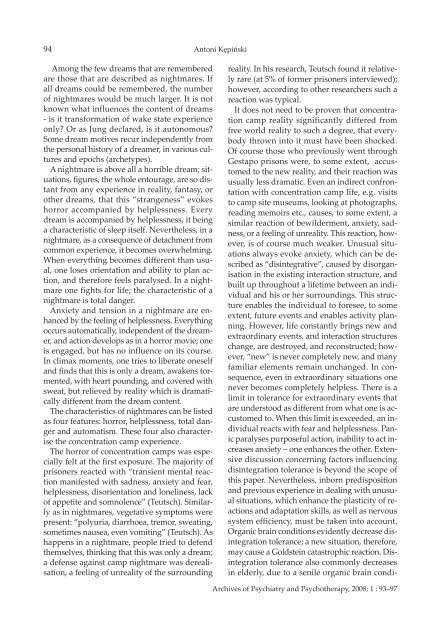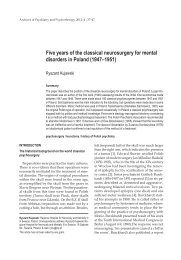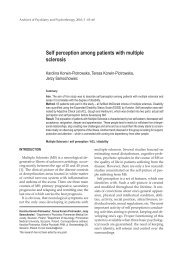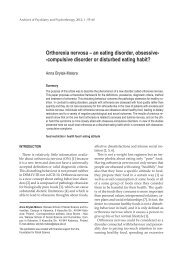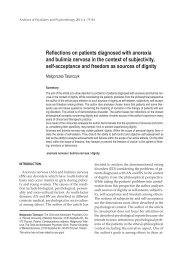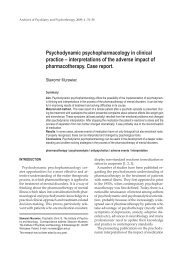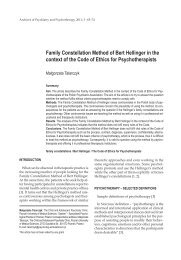93 The Nightmare - Archives of Psychiatry and Psychotherapy ...
93 The Nightmare - Archives of Psychiatry and Psychotherapy ...
93 The Nightmare - Archives of Psychiatry and Psychotherapy ...
You also want an ePaper? Increase the reach of your titles
YUMPU automatically turns print PDFs into web optimized ePapers that Google loves.
94 Antoni Kępiński<br />
Among the few dreams that are remembered<br />
are those that are described as nightmares. If<br />
all dreams could be remembered, the number<br />
<strong>of</strong> nightmares would be much larger. It is not<br />
known what influences the content <strong>of</strong> dreams<br />
- is it transformation <strong>of</strong> wake state experience<br />
only? Or as Jung declared, is it autonomous?<br />
Some dream motives recur independently from<br />
the personal history <strong>of</strong> a dreamer, in various cultures<br />
<strong>and</strong> epochs (archetypes).<br />
A nightmare is above all a horrible dream; situations,<br />
figures, the whole entourage, are so distant<br />
from any experience in reality, fantasy, or<br />
other dreams, that this “strangeness” evokes<br />
horror accompanied by helplessness. Every<br />
dream is accompanied by helplessness, it being<br />
a characteristic <strong>of</strong> sleep itself. Nevertheless, in a<br />
nightmare, as a consequence <strong>of</strong> detachment from<br />
common experience, it becomes overwhelming.<br />
When everything becomes different than usual,<br />
one loses orientation <strong>and</strong> ability to plan action,<br />
<strong>and</strong> therefore feels paralysed. In a nightmare<br />
one fights for life; the characteristic <strong>of</strong> a<br />
nightmare is total danger.<br />
Anxiety <strong>and</strong> tension in a nightmare are enhanced<br />
by the feeling <strong>of</strong> helplessness. Everything<br />
occurs automatically, independent <strong>of</strong> the dreamer,<br />
<strong>and</strong> action develops as in a horror movie; one<br />
is engaged, but has no influence on its course.<br />
In climax moments, one tries to liberate oneself<br />
<strong>and</strong> finds that this is only a dream, awakens tormented,<br />
with heart pounding, <strong>and</strong> covered with<br />
sweat, but relieved by reality which is dramatically<br />
different from the dream content.<br />
<strong>The</strong> characteristics <strong>of</strong> nightmares can be listed<br />
as four features: horror, helplessness, total danger<br />
<strong>and</strong> automatism. <strong>The</strong>se four also characterise<br />
the concentration camp experience.<br />
<strong>The</strong> horror <strong>of</strong> concentration camps was especially<br />
felt at the first exposure. <strong>The</strong> majority <strong>of</strong><br />
prisoners reacted with “transient mental reaction<br />
manifested with sadness, anxiety <strong>and</strong> fear,<br />
helplessness, disorientation <strong>and</strong> loneliness, lack<br />
<strong>of</strong> appetite <strong>and</strong> somnolence” (Teutsch). Similarly<br />
as in nightmares, vegetative symptoms were<br />
present: “polyuria, diarrhoea, tremor, sweating,<br />
sometimes nausea, even vomiting” (Teutsch). As<br />
happens in a nightmare, people tried to defend<br />
themselves, thinking that this was only a dream;<br />
a defense against camp nightmare was derealisation,<br />
a feeling <strong>of</strong> unreality <strong>of</strong> the surrounding<br />
reality. In his research, Teutsch found it relatively<br />
rare (at 5% <strong>of</strong> former prisoners interviewed);<br />
however, according to other researchers such a<br />
reaction was typical.<br />
It does not need to be proven that concentration<br />
camp reality significantly differed from<br />
free world reality to such a degree, that everybody<br />
thrown into it must have been shocked.<br />
Of course those who previously went through<br />
Gestapo prisons were, to some extent, accustomed<br />
to the new reality, <strong>and</strong> their reaction was<br />
usually less dramatic. Even an indirect confrontation<br />
with concentration camp life, e.g. visits<br />
to camp site museums, looking at photographs,<br />
reading memoirs etc., causes, to some extent, a<br />
similar reaction <strong>of</strong> bewilderment, anxiety, sadness,<br />
or a feeling <strong>of</strong> unreality. This reaction, however,<br />
is <strong>of</strong> course much weaker. Unusual situations<br />
always evoke anxiety, which can be described<br />
as “disintegrative”, caused by disorganisation<br />
in the existing interaction structure, <strong>and</strong><br />
built up throughout a lifetime between an individual<br />
<strong>and</strong> his or her surroundings. This structure<br />
enables the individual to foresee, to some<br />
extent, future events <strong>and</strong> enables activity planning.<br />
However, life constantly brings new <strong>and</strong><br />
extraordinary events, <strong>and</strong> interaction structures<br />
change, are destroyed, <strong>and</strong> reconstructed; however,<br />
“new” is never completely new, <strong>and</strong> many<br />
familiar elements remain unchanged. In consequence,<br />
even in extraordinary situations one<br />
never becomes completely helpless. <strong>The</strong>re is a<br />
limit in tolerance for extraordinary events that<br />
are understood as different from what one is accustomed<br />
to. When this limit is exceeded, an individual<br />
reacts with fear <strong>and</strong> helplessness. Panic<br />
paralyses purposeful action, inability to act increases<br />
anxiety – one enhances the other. Extensive<br />
discussion concerning factors influencing<br />
disintegration tolerance is beyond the scope <strong>of</strong><br />
this paper. Nevertheless, inborn predisposition<br />
<strong>and</strong> previous experience in dealing with unusual<br />
situations, which enhance the plasticity <strong>of</strong> reactions<br />
<strong>and</strong> adaptation skills, as well as nervous<br />
system efficiency, must be taken into account.<br />
Organic brain conditions evidently decrease disintegration<br />
tolerance; a new situation, therefore,<br />
may cause a Goldstein catastrophic reaction. Disintegration<br />
tolerance also commonly decreases<br />
in elderly, due to a senile organic brain condi-<br />
<strong>Archives</strong> <strong>of</strong> <strong>Psychiatry</strong> <strong>and</strong> <strong>Psychotherapy</strong>, 2008; 1 : <strong>93</strong>–97<br />
Księga1<strong>Archives</strong>_08.indb 94 2008-03-04 12:53:52


